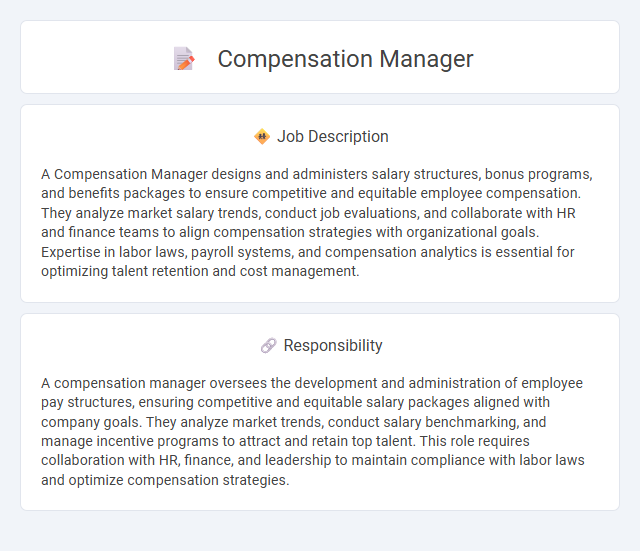
A Compensation Manager designs and administers salary structures, bonus programs, and benefits packages to ensure competitive and equitable employee compensation. They analyze market salary trends, conduct job evaluations, and collaborate with HR and finance teams to align compensation strategies with organizational goals. Expertise in labor laws, payroll systems, and compensation analytics is essential for optimizing talent retention and cost management.
Individuals with strong analytical skills and a keen interest in data-driven decision-making are likely suitable for a Compensation Manager role. Those who thrive in structured environments and demonstrate effective communication abilities may find this position fulfilling. Candidates less comfortable with detailed financial data or complex regulatory frameworks might face challenges in adapting to the responsibilities of this job.
Qualification
A Compensation Manager must possess a strong background in human resources, typically requiring a bachelor's degree in HR management, business administration, or a related field, with many employers preferring a master's degree or professional certification such as CCP (Certified Compensation Professional). Expertise in compensation design, market analysis, salary benchmarking, and compliance with labor laws is essential. Proficiency in HRIS systems, analytical skills, and experience managing salary structures and incentive programs are critical qualifications for success in this role.
Responsibility
A compensation manager oversees the development and administration of employee pay structures, ensuring competitive and equitable salary packages aligned with company goals. They analyze market trends, conduct salary benchmarking, and manage incentive programs to attract and retain top talent. This role requires collaboration with HR, finance, and leadership to maintain compliance with labor laws and optimize compensation strategies.
Benefit
A Compensation Manager is likely responsible for designing and overseeing employee benefit programs that align with company goals and employee needs. They probably analyze market trends and internal data to ensure benefits packages remain competitive and cost-effective. Managing compliance with regulations and enhancing employee satisfaction through tailored benefits might be key aspects of the role.
Challenge
The role of a Compensation Manager often involves navigating the challenge of balancing employee satisfaction with budget constraints and organizational goals. There is a high probability that they will need to constantly update compensation structures to remain competitive in a shifting job market. Overcoming these challenges requires analytical skills and strategic thinking to ensure fair and motivating pay systems.
Career Advancement
Compensation managers play a critical role in designing and managing employee pay structures, ensuring competitive and equitable compensation packages that align with company goals. Expertise in data analysis, market salary trends, and regulatory compliance paves the way for career advancement into senior human resources leadership roles such as HR director or vice president of compensation and benefits. Mastery of compensation strategy combined with strong communication skills enhances opportunities for upward mobility in corporate HR departments or consulting firms.
 kuljobs.com
kuljobs.com